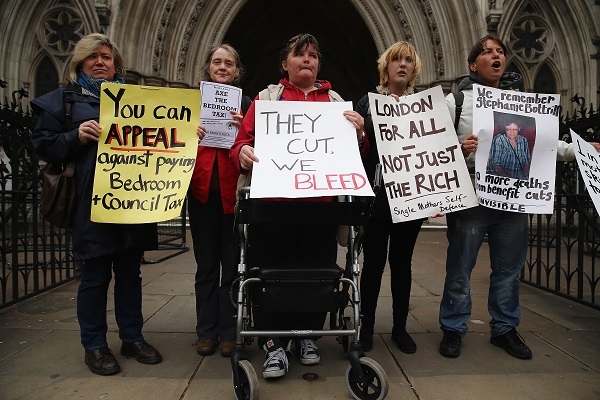The High Court has rejected the “bedroom tax” claimants’ case. In a ruling issued earlier this morning, Lord Justice Laws said that ‘the PSED [Public Sector Equality Duty on the benefit reforms] was fulfilled; and the effects of the HB [Housing Benefit] cap were properly considered in terms of the discipline imposed by the requirement of proportionality.’ On the point of the government providing additional help for disabled people affected by the cap, the judge wrote: ‘provision of extra funding for DHPs [‘discretionary housing payments’] and advice and guidance on its use cannot be said to be a disproportionate approach to the difficulties which those persons faced.’
Laws added that certain arguments of the claimants ‘amount to an attempt to persuade the court to “micro-manage” the policy-making process’. He expanded on this elsewhere in the judgment. Two paragraphs are worth noting because they have a clear bearing on the rows that are brewing between the government and certain legal groups on the issues of judicial review and the European Convention on Human Rights.
The first relates to the function of the courts (my emphasis):
‘So, as I have said, the discipline of the PSED lies in the required quality, not the outcome, of the decision-making process. This is well borne out by the learning; but in my judgment it reflects a more general constitutional balance. Much of our modern law, judge-made and statutory, makes increasing demands on public decision-makers in the name of liberal values: the protection of minorities, equality of treatment, non-discrimination, and the quietus of old prejudices. The law has been enriched accordingly. But it is not generally for the courts to resolve the controversies which this insistence involves. That is for elected government. The cause of constitutional rights is not best served by an ambitious expansion of judicial territory, for the courts are not the proper arbiters of political controversy. In this sense judicial restraint is an ally of the s.149 duty, for it keeps it in its proper place, which is the process and not the outcome of public decisions. I would with respect underline what was said by Elias LJ at paragraph 78 in Hurley, rejecting a submission for the claimants that it was for the court to determine whether appropriate weight has been given to the duty: “it would allow unelected judges to review on substantive merits grounds almost all aspects of public decision making.”’
The second relates to sovereignty (my emphasis):
‘In my judgment some caution is required as regards the use to be made of unincorporated international conventions. The constitutions of many of the States Parties to the ECHR provide for the automatic incorporation of an international treaty into domestic law upon its being entered into by the appropriate government agency. The constitution of the United Kingdom does not; such a treaty only has effect in municipal law if an Act of Parliament so provides. I certainly accept that under our law an unincorporated treaty may be deployed as an aid to construction of an ambiguous statute to whose subject-matter it is relevant (so much has been clear at least since Garland v British Rail Engineering [1983] 2 AC 751); but care is needed to ensure that such a treaty is not seen as a source of substantive domestic legal rights. The point is important because the executive government, which enters into treaties in the name of the Crown, is not generally a source of law save where it exercises powers delegated by Parliament.’
You can expect both paragraphs to be quoted liberally in the coming months; and perhaps by both sides of the argument. The first obviously limits judicial action; but one might turn the argument on its head and say that the courts cannot properly monitor the process of public decisions if judicial review is diminished. The second clearly reiterates that the courts can only apply conventions that parliament has passed into law; therefore, there should not be ‘judicial creep’ into the ever growing body of international law unless it is passed into British law by parliament. Yet it follows that if parliament abhors present judgments it should stop whingeing about dastardly judges and repeal the offending primary legislation.
PS: Although this “bedroom tax” case was rejected, there is an issue with the government having failed to comply with an earlier judgment in the Gorry case, relating to ‘children who are unable to share because of their disabilities’. Lord Justice Laws, however, said that he expects new regulations to be in place shortly.






Comments